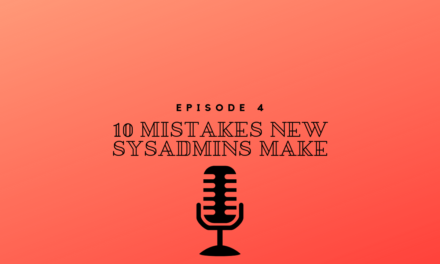In this podcast, I talk about using Systems Administration as a pivot point to other IT Careers. You can transition to another IT role easily from Systems Administration.
I also talked about my eBook “Build a Home Lab for Under $400” and you can get that for free at:
https://400dollarlab.com
Transcript
Mike
Hey everyone and welcome to the sysadmin school podcast with me Mike Walton. Now today I want to talk about using Systems Administration as a pivot point for your IT career. Me personally I enjoy systems administration so I am not going to use it as a pivot point in IT. But that is one of the great things about Systems Administration, you get this amazing foundation of knowledge that you can then apply in different areas of it.
Now I have some notes of items I want to make sure I cover. First off Systems Administration really does kind of provide you near-limitless expansion and growth. You can always expand in the technology side and become an expert or subject matter expert in different technologies. Or you can expand into the management side of things. If you are aspiring to be a C-Level executive. You can be a CIO or a CTO, something like that you can easily expand to from being a Systems Administrator.
Many companies expand Systems into many different areas of IT. A lot of places your Systems Administrators are also you Help Desk, Network Admins, Storage Admins. You become a project planner because you want to execute a project and you need to plan it appropriately. There is even data center design which can really get deep into HVAC. So AC and heat and ductwork and electrical for your datacenters. That is really incredibly important knowing how airflow works are important. You can see those are just a few of the little pivot points where a lot of companies that is what their systems administrators do. You can even add in a little development. I worked for a company for a number of years where I was systems administrator, helpdesk, network admin, I was the Exchange and email admin, I was also a sudo developer in that when we couldn’t find software to fulfill a certain need. I would develop software to fulfill that need. That was all under my role as a Systems Administrator. Now in other companies, your Network Admins and developers are going to be very separate people.
Systems Administrators are also the center of any IT department and the reason I say that is because if you think of what a Systems Administrator does. They work on servers typically, that is your straight Systems Administrator type job, you work on a server. Now client machines connect to a server, applications developers run on a server, applications purchased from a third party run on servers as well. So you can see where Systems Administration is really the heart and the center of IT because everything runs on the equipment that you manage. So its really important to have a good foundation as a Systems Administrator. Also the storage of where everything is saved, users work directories, users personally directories or whatever you call it in your business. That stuff if on storage that is probably managed by a Systems Administrator.
Now as a Systems Administrator and being able to have all of these different aspects of IT at your fingertips you get experience in a lot of different areas. I did not go to school to be a developer, I took a couple of development classes, so really the development that I learned was on the job learning and learning in my personal time. I enjoyed doing some of that stuff which really made it work. Now with PowerShell, all Systems Administrators need some sort of developer type foundation. Because PowerShell is a scripting language it uses a lot of different aspects from development languages. You have variables, IF Then Else, For Each Loops and stuff like that. So that is where you get a… I hope I bring the point across that you get a whole bunch of different aspects of IT from being a Systems Administrator.
Your a Systems Administrator and you decide that this isn’t for me. Systems Administrations great but I want to move into a different aspect of IT for my career. Because you are a systems Administrator you know where you want to go, so maybe servers aren’t the thing for you and you want to transition into Network Administration. How do you do that? Honestly, the easiest way to do it is to ask. It is super simple. Maybe you work for a company and you have an IT Network Admin, just ask. Ask the network admin if you can shadow them for a day or two. Ask the network admin if can help him with anything. Ask the network admin if he is looking for a junior network admin, or if he would be willing to do some cross-training with you.
Most people I have encountered in IT are incredibly willing to teach and help anybody who is in IT to grow. It is a really great community. So really the best way is just to ask. Ask your network admin if you can assist him in something. If you want to do to the developer side, as a developer if you can watch or help with a project or even review some of their code if you understand it. It really goes with any aspect of IT, if you want to transition into somewhere different ask somebody who is in the field. I am not trying to oversimplify it but I want o get the point across that it isn’t that difficult. You are not stuck in a systems administrator or help desk role.
The company I work for, help desk employees are frequently coming in and asking to learn more about network administration, or more about email administration, or phone systems administration, or storage administration. They come and ask the people who manage those devices, that equipment, can they look over our should, can they help us in any way, can they do something to take a load off of us and improve their knowledge. I think it is amazing and great when someone as the initiative to push through and ask. You learn more and retain information more and you are much more enthusiastic about your job when you do that.
I take every opportunity I can to help people who generally want to learn new things. Now I am not going to go through and force someone to learn but I have a few people I know are incredibly interested in stuff and whenever I get the opportunity I will grab them and say “Hey you want to see this”. This is how you can make those pivot point. You express interest and let people know you are interested. When you make those connections with people who already do that, more than likely they are going to reach out to you and say “hey I am about do to something, do you want to see how this is done?” That’s great and has been my experience and is an amazing community of people willing and openly share.
So I have now droned on now, let me look as some of the other points. What do you do if you can’t find someone to teach. Let’s say you work in an IT department and there is no development team. Everything you use is bought third party. How do you make that pivot point? Well, what you need to do is you need to look elsewhere. Look for companies and non-profits that can help you with this. Even IT communities and message boards, forums, and place like my site thesysadminschool.com. That will help you get experience to connect with other people and just work with people who want to help teach you. You can also look for internships, internships are great ways because you can intern as a junior developer or with a company that develops software. so simple things like that, you really just need to ask and most places will help if you are willing to donate your time. Most places will say sure we would love to share our knowledge. They may even offer to pay you if they are understaffed. With that, you gain that knowledge and experiences so you can make the pivot point in your IT career.
Another way is to build your own lab. I talk about this in my free ebook. How to build a home lab for under $400. You can get that by going to 400dollarlab.com. It is just a redirect that will take you right to my page where you can get the ebook for free. I think we came in somewhere around $389 building our lab for the book. That is a great way to learn, you build your own home lab, build your servers which as a Sysadmin you know how to do. Then you can practice with developing, you can buy tutorials online, read tutorials online, get everything you need and start practicing. You can build websites with server-side code using PHP or ASP or NodeJS or all these other languages you may want to learn. If you want to do Windows or complied programs, C++, C# or something like that, Java. Building your own lab is a great way to help you explore and do some of these on your own and learn yourself. That is a lot of how my career has gone. On the job training and using my lab to experience with different technologies to progress. This is how I would choose to pivot if I want to move into a different aspect of IT.





